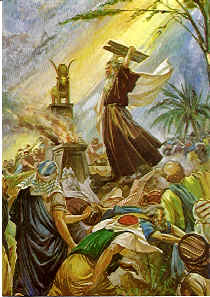God says That I may consume [my anger] (Ex. 32.10), but Moses, his Man, prays and says Turn from thy fierce wrath (verse 12). By reason of this prayer God 'repents' of all the affliction which threatened to take place (Memar 4.8)
On that other occasion also God made himself little even in the midst of his fierce anger, when in his wrath against the people because of the consecration of the (golden) calf he demanded of his servant Moses, Let me alone, and I will wax hot in wrath and destroy them, and I will make thee into a great nation.(Exodus 32:10) On this you are in the habit of insisting that Moses was a better person than his own God—deprecating, yes and even forbidding, his wrath: for he says, Thou shalt not do this: or else destroy me along with them.(Exodus 32:32) Greatly to be pitied are you, as well as the Israelites, for not realizing that in the person of Moses there is a prefiguring of Christ, who intercedes with the Father, and offers his own soul for the saving of the people. But for the present it is enough that the people were granted even to Moses in his own person. Also, so that the servant might be in a position to make this request of his Lord, the Lord made that request of himself. That is why he said to his servant, Let me alone and I will destroy them, so that the servant might forestall this by his prayer and his offering of himself, and so that you by this might learn how much is permitted to one who has faith, and is a prophet, in the presence of God. [Against Marcion 2.26]
I think this shows once and for all that (a) the Marcionites were not 'against' the 'Jewish god' or (b) that they didn't 'hate' Judaism. They only 'devalued' the Jewish god insofar as they taught that 'the Man of God' was greater than He.
























































